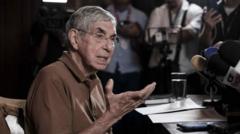The former president characterizes the action as symptomatic of a strained relationship between smaller nations and U.S. foreign policy.
Oscar Arias, the former president of Costa Rica and a Nobel Peace Prize laureate, announced that his U.S. visa has been revoked, an action he believes occurred shortly after he publicly criticized former President Donald Trump. In a recent news conference held in San José, Arias stated he received a brief email from the U.S. government informing him of the visa cancellation, but he has not been provided with an explanation.
The 84-year-old politician reflected on the timing of the decision, indicating that it may stem from his historical ties with China during his presidency from 2006 to 2010, when he established diplomatic relations with Beijing by severing ties with Taiwan. He emphasized that his diplomatic actions, particularly around China, are well-known globally and hinted that the current U.S. administration's stance towards China might be a factor in his visa revocation.
Arias also suggested that while the visa revocation might seem to reflect Trump's influence, he believes it originated from the U.S. State Department. "During my governments, Costa Rica never received orders from Washington as if we were a banana republic," he asserted, alluding to the diminishing autonomy smaller nations often face in their international relations.
His comments come amidst ongoing tensions between the U.S. and several Central American nations that have shown a propensity to strengthen ties with China. Interestingly, three Costa Rican assembly members who opposed a recent decree by President Rodrigo Chaves—favoring exclusion of Chinese firms in the country's 5G development—also had their U.S. visas revoked. This trend raises questions about U.S. diplomatic motivations in the region and reflects broader geopolitical dynamics involving Central America and China.
Oscar Arias, the former president of Costa Rica and a Nobel Peace Prize laureate, announced that his U.S. visa has been revoked, an action he believes occurred shortly after he publicly criticized former President Donald Trump. In a recent news conference held in San José, Arias stated he received a brief email from the U.S. government informing him of the visa cancellation, but he has not been provided with an explanation.
The 84-year-old politician reflected on the timing of the decision, indicating that it may stem from his historical ties with China during his presidency from 2006 to 2010, when he established diplomatic relations with Beijing by severing ties with Taiwan. He emphasized that his diplomatic actions, particularly around China, are well-known globally and hinted that the current U.S. administration's stance towards China might be a factor in his visa revocation.
Arias also suggested that while the visa revocation might seem to reflect Trump's influence, he believes it originated from the U.S. State Department. "During my governments, Costa Rica never received orders from Washington as if we were a banana republic," he asserted, alluding to the diminishing autonomy smaller nations often face in their international relations.
His comments come amidst ongoing tensions between the U.S. and several Central American nations that have shown a propensity to strengthen ties with China. Interestingly, three Costa Rican assembly members who opposed a recent decree by President Rodrigo Chaves—favoring exclusion of Chinese firms in the country's 5G development—also had their U.S. visas revoked. This trend raises questions about U.S. diplomatic motivations in the region and reflects broader geopolitical dynamics involving Central America and China.




















